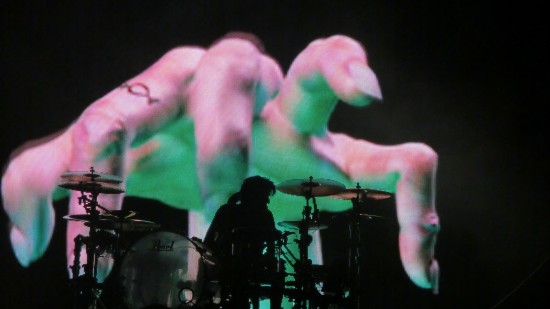
Much has been written on the question what rock really is. Yet, no convincing answer is in sight. So maybe it´s time for yet another attempt at answering a question, which, apparently, is quite hard to answer. First, let’s try to do some thinking on the angle which would lend itself for such an undertaking. There are lots of ways to look at music – you can set your sight on the emotional side to it, you can stick to the techniques employed, or you basically peruse lyrics to decide whether something is rock or not. Another possible way of arriving at an answer is to differentiate the music internally. This is, presumably, the most common way to decide what may be deemed rock and what is just some modification of it – say Stoner/Desert Rock, Garage Rock, Indie Rock, Punk Rock, and so on. Paradoxically, in this way of deciding, the term rock assumes two different identities: in the first place, the term denotes the overall kind of music which is based on drum, guitars, bass and a singer as opposed to other kinds of music, let’s say Electro/Electronica. Secondly, the term refers to the kind of rock which is considered to be classic rock – as opposed to other varieties of rock. So there definitely is some kind of equivocality to the term and I´m sure one would be hard-pressed to rid the term of its ambiguity. So, why even bother? Let´s just turn another corner.
Some weeks ago, I attended a Mötley Crüe Concert in Berlin. And I presume to say: they embody the idea of rock. I´m quite sure this statement will evoke rather strong feelings on the part of some people … to say the least. And of course one could consider this indicative of someone who has not the slightest idea of what rock is meant to be. Seriously, what renders those four guys more or purer rock than the next band? The answer is: their setting against the zeitgeist. But before we take the sledgehammer to crack a nut, we go back a step.
Today´s music, in the author’s humble opinion, progressively consists of bands which sing about how bad the world is, what would make the world a better place, how to prevent the environment from pollution, or whatever nonsense they can come up with of in terms of saving the world. Still worse: U2.
Not that these topics are not important or that they are to be neglected or whatever. And of course, one could have a serious conversation regarding the question if it is not a good thing that famous people take advantage of their popularity to make these topics operate on the minds of their listeners. Then again, not everything is meant to be concerned with everything. So let´s just scrap the idea that rock is in the position to save the world or is meant to be a tool serving it, or a common good, or what have you. Neither will nor can music ever be a substitute for politics – or whatever you think what kind of people/institutions/strong ideas shape the world the way it is. And even though many bands do concern themselves with politics, they basically play music – and most of them would probably not cut it in politics (blessedly!).
Back to the overall topic: having politicization identified as a recent trajectory of modern music, there are bands out there that strongly oppose this development. Whether they are doing it intentionally or inadvertently is not for this article to decide. Basically, they are just doing it. And Mötley Crüe definitely rank among those few bands practicing rock without too much reflection. Not just the lyrics – usually dealing with the well-known holy trinity of R´n´R – speak volumes about the attitude they are intent on displaying. And so do their live shows – which, admittedly, are not packed with surprises. It´s impossible to ignore that Mr. Neil uses the same announcement in the same moments of the same songs over and over again. You do not even have to see them live to become aware of this. Listening to their live records is perfectly sufficient. Seen one, seen ´em all.
Notwithstanding this: over the years they created this thing called Mötley Crüe which keeps waving the flag of non-reflective, straight to the point kind of R´n´R (if you prefer the term Glam Metal – knock yourself out). And it sets them apart. There is no political message to the music, let alone advice on improving the world. Even more importantly, no sign of irony appears on the horizon. Considering their strong influence on bands like Steel Panther and the amount of irony these bands project, this is quite remarkable; and definitely a feature to take note of.
By the way, criticizing a (presumed) lack of authenticity will set you on a path leading nowhere fast. This is about the phenomena Mötley Crüe and not about the question whether the persons making up the band live up to the expectations fans are addressing them with. In fact, the members as persons are irrelevant to the point I´m trying to get at. What counts is the product they created.
It all comes down to this: attitude. Playing live surrounded by – say – “background dancers”, no announcement without excessive use of the F*** word, lyrically focusing on the rather non-intellectual, highly sex- or drinking-related topics, throwing buckets full of stage blood into the audience once the concert draws to a close, releasing a single plainly called “Sex”, and so on. Maybe it is not exactly a cutting edge show they put up, but – in a way – it is the essence of what rock is meant to be: strutting around full of attitude!
And this tips the scale in their favor as no one ever expects or wants a rock band to try to save the world. Quite on the contrary! Unless, of course, you go for U2…
(Author´s Photograph)

Schreibe einen Kommentar